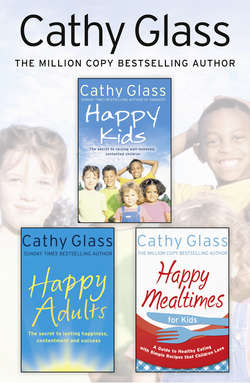Читать книгу Cathy Glass 3-Book Self-Help Collection - Cathy Glass, Cathy Glass - Страница 41
Bullying
ОглавлениеAs your child is now away from you, at school, for the greater part of each day, make sure you have time to talk and listen to him or her, particularly when he or she comes home at the end of school, bubbling with news of the day. Be on the lookout for any worries or anxieties your child might have connected with school, and obviously praise and encourage all his or her achievements. Be alert for any signs your child is being bullied, and take any concerns your child might have seriously. Despite what many schools like to believe (even those with good anti-bullying policies), incidents of bullying are commonplace and usually happen in the playground.
Also – and this is more difficult – watch out for signs that your child could be bullying others. None of us likes to believe that our little treasure is capable of wilfully harming another child, but all children at some time will say or do something that is unkind, dominating or hurtful to another child. If such behaviour comes to your attention, don’t ignore it, as it will escalate if left unchecked, but don’t over-react either. Act swiftly and firmly, and deal with the incident as you have been dealing with all your child’s negative behaviour, by using the 3Rs. And remember, it is the behaviour and not the child that is wrong – ‘Tom, it was cruel to do that to Sam,’ not ‘You are cruel’. Explain to your child why the behaviour or remark was wrong (that it was hurtful and we should be kind to others and respect their feelings), and that it mustn’t happen again.
Some children are naturally more forceful and domineering than others, and while a child continually insisting that he or she should be the leader in a game or being very bossy isn’t bad bullying it is a form of control, which is only one step away from bullying. The child needs to be taught that their playmates should be given a turn to be in charge of the game. Children at this age vary greatly in their confidence and leadership skills, and while some children have a flair for organising, others need a lot of encouragement. Obviously you won’t be able to oversee your child in the playground, but listen carefully to what he or she tells you about time spent in the playground with other children.
When your child has friends home to play, be aware of their conversations, and make sure their games are not one-sided, with Tom or Claire controlling everyone else all of the time. It is essential that children learn teamwork and cooperation with others at this age, not only for successful and enduring friendships, but to put in place the skills they will need in adult life to function at work and in their relationships with other adults.
